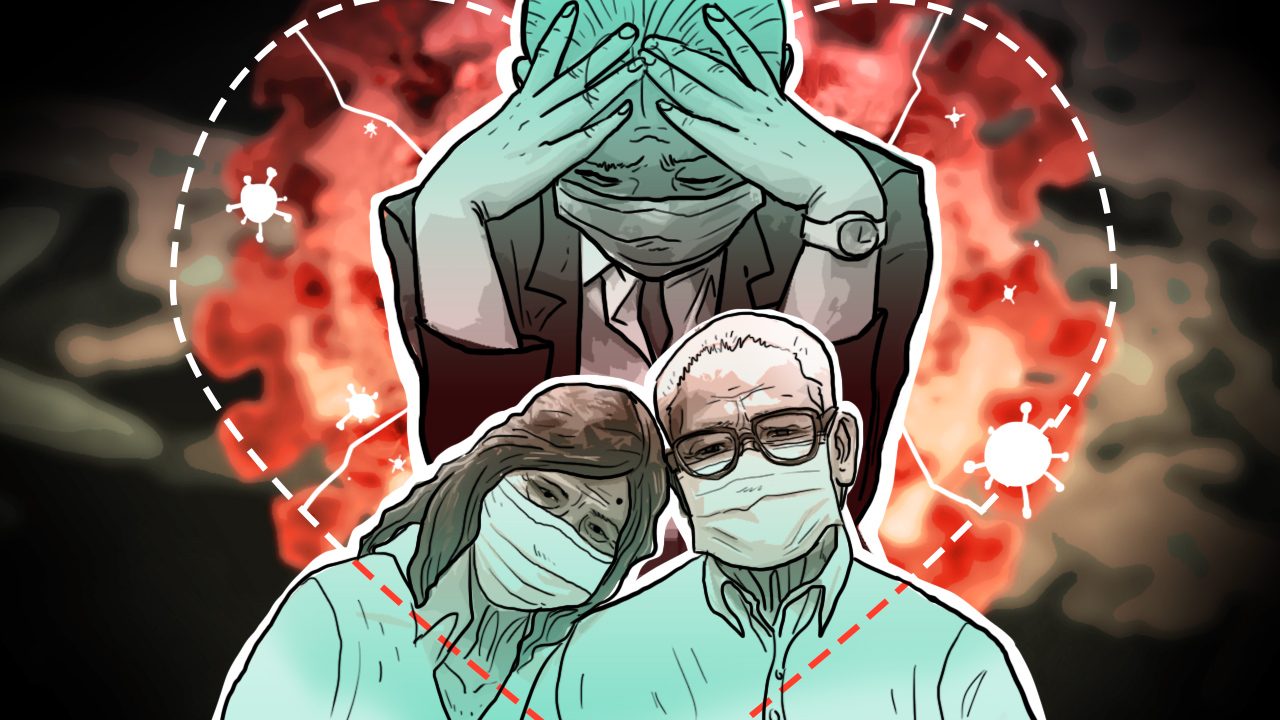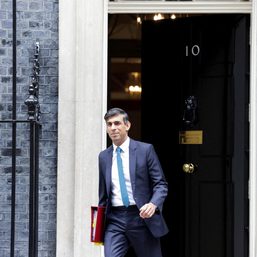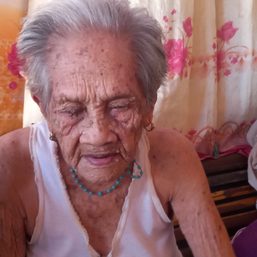SUMMARY
This is AI generated summarization, which may have errors. For context, always refer to the full article.

MANILA, Philippines – The COVID-19 pandemic brought upheavals in the two years it hurtled around the country. Among the most dramatic fallouts were changing family dynamics.
For many adults living with their parents, the pandemic required a shifting of roles.
According to the Census of Population and Housing, there were 5.86 million Filipinos aged 65 years and older in 2020.
Many seniors, still active but vulnerable due to morbidities, found themselves trapped at home. Their world narrowed physically but exploded into a confusing digital universe.
Finances, marketing, medical appointments, and the payment of bills required the boomer generation to navigate new platforms, often needing help from their children.
Three years after COVID came to town, two daughters reflect on how they had to adjust to their parents’ difficulties.
Routines
Sandee Molato, 45, lives with her parents Lyn, 71, and Gel, 73 in Cavite.
During the first few weeks of lockdown, her parents kept busy with things around the house: Lyn decluttered all the rooms, Gel undertook long-overdue repairs.
Each stuck to a daily schedule of activities; no one was idle. They would gather for meals and check on each other.
Among the World Health Organization’s tips for maintaining mental health during the pandemic include keeping daily routines or making new ones.
- Get up and go to bed at similar times every day.
- Keep up with personal hygiene.
- Eat healthy meals at regular times.
- Exercise regularly.
- Allocate time for working and time for resting.
- Make time for doing things you enjoy.

Breaking out of the bubble
The Molato couple was kept preoccupied…that is, until all of the appliances and electrical outlets in the house had been fixed and each room had been decluttered, twice.
“Then, they could no longer find anything to do in the house and they still couldn’t go out of the house,” said Sandee.
Her parents got antsy.
Sandee eventually returned to work at their family-owned school. She brought along her mother every two weeks but kept her in the office, away from other workers.
They had a strict route: from house to school and back; no side trips, no stopovers..
But at the end of 2021, with everyone in the household vaccinated, her parents began breaking safety rules.
“They would bring me a bag of fast food. That’s how I found out they went out to buy at the drive-thru,” Sanndee remembered.
The seniors also resumed doing the groceries.
Stranded by COVID-19
Ines, 45, lives with her daughter and her parents: Mari-An, now 75, and George, 91.
When COVID-19 hit the country, Mari-An, in her early 70s, was still shuttling shuttling between Dumaguete, where they have family businesses, and Manila,
The lockdown grounded her for 10 months in Dumaguete where the first confirmed COVID-19 case in the country was discovered.
“We kept reminding her: Please, don’t go out! Just stay at home!” Ines recalled in an interview with Rappler in early March 2023.
Relatives promised ensure her mother’s welfare.
Disruption of routines can also affect cognitive functions, leading to mental health challenges, according to an article published by Cambridge University Press Public Health Emergency Collection.
In “COVID-19 and mental health of older adults in the Philippines: a perspective from a developing country,” authors Robert D. Buenaventura, Jacqueline B. Ho, and Maria I. Lapid noted that pandemic physical distancing protocols challenged older people’s needs for social connectedness and engagement.

Defiance
Ines’ father, George, was happy to comply with lockdown rules during the first few weeks.
But as months passed, he missed being able to go out, especially his walks around the neighborhood.
After weeks of strict and ever-changing lockdown rules in Manila, George got agitated with being confined indoors.
“He kept asking when it would be okay to go out again,” said Ines.
George was in constant communication with his caddy at the golf course.
“Once, even though he was told the golf course was still closed, he drove all the way to Taguig, only to confirm it,” said Ines.
She laughs about it now but it scared her back then.
Months later, when George’s golf course re-opened, Ines would wake up to find the key to the car missing.
George would come back after having played a few rounds, a big grin on his face.
But when he turned 89, the family found that George’s eyesight was not good enough to let him drive on his own anymore.
They reached a compromise: he would give up driving and Ines would bring him to play golf once a week.
Coping mechanisms
To care better for her parents, Ines joined a webinar.
“One of the topics was how to ease your own anxiety when you’re caring for someone elderly,” she said. “You should make sure you have a plan and prepare for different scenarios.”
Ines and her sisters met online to make a concrete plan so that, should any emergency occur, she could just execute it.
Psychologist Rac General from MindNation also experienced taking care of elderly parents.
“Observe, practice active listening, and empathize,” she advised others in the same situation.
General said children of aging parents should understand the following:
- Their parents’ past history, including their upbringing and relationships with family members and peers as they were growing up;
- The changes in their parents’ physical health every year;
- What makes them who they are or the cause of their attitudes and behavior, like being masungit (moody)
- What they need and what they want, like medication and first aid kit; and
- Their advanced age and one’s acceptance that they will regress.

Omicron disruption
In early 2022 the more infectious but less virulent Omicron variant reached the Philippines.
COVID finally came into the Molato and Templo households.
Neither set of parents got seriously ill. But Sandee’s found the short separation from each other painful.
Sandee got to know her parents more during that period, picking up cues like facial expressions and tone of voice.
Ines and her father finally acknowledged and accepted a reversal of roles: she was now in charge of the administration of the household.
“It was the first time I heard him tell people that he deferred to my decisions,” said Ines, “unlike before when they would say ‘I know better than you’ because they are older and have had more experiences.”
Ines stepped into the role.
“Whereas previously, I would try to avoid it, I finally took the responsibility.”
Patience, self-care

Both Ines and Sandee stressed the need for patience.
“There will be times when the things they say or ask will be repetitive. But you just have to answer, not to show annoyance, because that will agitate them,” Ines said.
“When something is heading toward a heated discussion, I pause and say we should take it up again later. I also am more mindful about putting myself in the other person’s shoes,” Sandee shared.
She also learned to value getting enough good quality sleep.
Ines, who used to bend backward to avoid offending, became more honest about her needs- space and quiet alone time – and learned to give others the same.
General’s advice hewed to the two women’s learnings.
Treat their parents in a respectful manner and don’t oppose them.
Remember: “Tatanda din kayo! (You, too, will grow old!)” -Rappler.com
Add a comment
How does this make you feel?
![[Two Pronged] I found out my husband is into ‘golden rain’ during our honeymoon](https://www.rappler.com/tachyon/2024/04/Two-Pronged-peeing-sex.jpg?resize=257%2C257&crop_strategy=attention)
![[Two Pronged] My friend has an abusive partner. What can I do?](https://www.rappler.com/tachyon/2024/04/limits-of-friendships-april-16-2024.jpg?resize=257%2C257&crop=414px%2C0px%2C1080px%2C1080px)
![[Two Pronged] Am I bi-curious? A lesbian? How do I explore these feelings?](https://www.rappler.com/tachyon/2024/04/two-pronged-bisexuality.jpg?resize=257%2C257&crop=283px%2C0px%2C720px%2C720px)
![[Two Pronged] Will watching porn and masturbating affect my future relationships?](https://www.rappler.com/tachyon/2024/03/two-pronged-single-female-30-year-old-virgin-porn.jpg?resize=257%2C257&crop=235px%2C0px%2C720px%2C720px)
![[WATCH] Spoil me but respect me: A sugar baby’s story](https://www.rappler.com/tachyon/2024/03/titlecard-03.jpg?resize=257%2C257&crop_strategy=attention)





![[OPINYON] Puting buhok at ang mapaminsalang ageism](https://www.rappler.com/tachyon/2024/03/IMHO-Ageism-March-11-2024.jpg?resize=257%2C257&crop=468px%2C0px%2C720px%2C720px)




There are no comments yet. Add your comment to start the conversation.